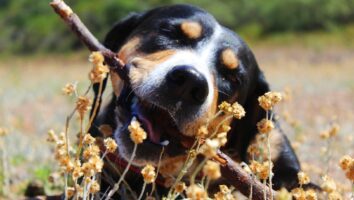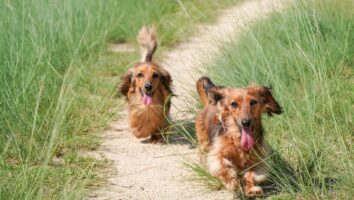Articles
Articles, questions and guides on pet care.
Megacolon in cats
Megacolon in cats is a term to describe an abnormality of the colon, which is the last part of the gut before the anus. With megacolon, the colon loses its motility, which is its ability to move…
What is the best food for my dog?
This is a particularly contentious issue as there are many very strong opinions amongst dog owners. What does make a good dog food? And, how should dogs be fed? This article looks at the different…
EPI (Exocrine Pancreatic Insufficiency) in dogs and cats
Exocrine Pancreatic Insufficiency (EPI) is a condition which can affect both dogs and cats, but is more commonly seen in dogs. An insufficient amount of digestive enzymes are made in the gut. These…
Help! Why won’t my dog eat?
Dogs are clever! They will often not eat if they feel nauseous or they have vomited recently. If they have vomited, they are more likely to eat after being fasted for a short time: 2 to 3 hours for…
Flatulence (farting) in dogs and cats
All animals produce gas in their gastrointestinal tract. It is normally expelled by the body either in the forms of farting from the bottom, or burping (eructation) from the mouth. Some flatulence…
Eating things that are not edible - pica in dogs
Pica is a term used to describe behaviour in dogs where they regularly eat items that are not considered edible. This sometimes includes repeated eating one specific item such as stones, but can…
Eating things that are not edible - pica in cats
Pica is a term used to describe behaviour in cats where they regularly eat items that are not considered edible. This sometimes includes repeated eating one specific item such as stones, but can…
Help! My pet has eaten….? Foreign bodies in dogs and cats
It is very common for dogs to eat things they shouldn’t, and sometimes this can get them into trouble. It is less common but still possible in cats, who tend to be more careful about what they…
Intussusception in dogs and cats
Intussusception is an uncommon problem that can occur in the intestine where one part of the gut slides into the next part in a telescoping action. This can cause a blockage or particle blockage…
Megaoesophagus in dogs
Megaoesophagus is a condition where the muscular food pipe, which connects the throat to the stomach (the oesophagus), does not function normally. Food and saliva cannot move into the stomach, as…
How to do an elimination diet food trial for dogs
Elimination diet food trials are done in dogs both to diagnose and treat various food intolerances or allergies. Read our article to learn how to do one successfully!
Changes in the colour of your pet’s poo?
Stool colour is an excellent indicator of intestinal health. Many different conditions can have an impact on stool colour and consistency so sometimes these changes are the first indication of a…
Long-term diarrhoea in dogs and cats
Loose stools can become an ongoing problem in both dogs and cats. In medical terms, changes to the consistency of stools is termed chronic diarrhoea when it has been present for 2 weeks or more.…
Help! My dog gets travel sickness
Travel sickness, also called car or motion sickness, can affect pets as much as humans. Any form of travel can trigger travel sickness- dogs may shake, drool, yawn excessively, vomit and in some…
Common infectious causes of diarrhoea in dogs and puppies
There are many infectious causes of diarrhoea in dogs and puppies, and this is sometimes associated with other symptoms such as vomiting, lethargy and loss of appetite. A common step in the…
Vomiting bile in dogs and cats - causes, signs and treatment
Dogs and cats vomit bile when they have no other food content in the stomach. This could be because there has been previous vomiting, or it may be that they have not eaten recently. Bile and gastric…
Crate training for puppies
Puppies are often crate trained as part of an introduction to a new household. This can be an effective way of helping puppies to feel safe, secure and to prevent injury overnight. However, things…
Drooling in dogs and cats
Drooling, or hypersalivation (ptyalism), is the result of overproduction of saliva or the inability to swallow the saliva being produced, or both. Drooling in pets can present as a mild complaint or…






















